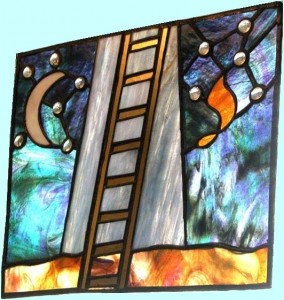
ב''ה
 Subscribe to our
Subscribe to ourAdapted from “Keeping in Touch: Torah Thoughts Inspired By The Works Of The Lubavitcher Rebbe,” by Rabbi Eliyahu Touger. Published by Sichos In English, and posted on Asknoah.org with their permission.
The Torah portion Vayeitzei relates that as Jacob left the Holy Land (Israel) to journey to Laban’s home where he would marry and establish his own household, he “encountered the place.” That is where he then slept and dreamt of a ladder reaching up to Heaven, with angels ascending and descending. Our Sages explain this as referring to the future site of the Holy Temple in Jerusalem. There Jacob prayed.

Jacob had lived in the home of his Isaac, and afterwards had studied under Shem (Noah’s son) and Eber (Noah’s great-great grandson), who were the righteous Noahide luminaries of the age. Now he was going to Haran, an idolatrous environment, where he would labor at mundane work, which would take much time away from his spiritual studies. Faced with such an awesome transition, Jacob turned to G-d, asking for material and spiritual success in the new phase of activity he was undertaking.
There is no way a person can insure success solely on the basis of his efforts. Material reality reflects only one dimension of our existence. Prosperity is a multifaceted Divine blessing and cannot be guaranteed through our efforts alone. Even when all the fundamentals add up, there are times when a business deal doesn’t work out, and other situations – when for no apparent reason – one’s efforts bring him success.
This is not mere chance. The Baal Shem Tov, founder of Chasidism, taught that even a leaf turning in the wind is directed by G-d’s will. Certainly it is true when speaking of what happens to people. Therefore, particularly when we set out on a new path, we should ask G-d through prayer for His assistance.
On the surface, however, such prayers are self-serving. A person is asking G-d for something for his own self. He is not praying for G-d’s sake; he is praying because of his own needs or wants. Is that spiritual? And is this what G-d desires?
Yes. G-d’s intent in creating our world was to have a dwelling place in the lower worlds; that His divine presence be revealed within the realm of material things. He didn’t create angels to inhabit this physical world. He wants a world where a person interacts with the physical and in so doing, understands that it is controlled by G-d. That is precisely the awareness generated when a person prays for his material well-being. He is concerned with everyday things, and he is asking G-d to grant him success in this realm. Instead of relying on his own resources, he is looking to G-d.
These prayers are extremely sincere. When a person asks for spiritual things, his requests may not come from his inner core. But when he prays for his material well-being, he puts his whole heart into his prayer. He is turning to G-d with all of his attention and asking for His help. In doing so, he consummates the purpose of creation, connecting G-dliness with the most mundane dimensions of worldly existence.

One of the primary focuses of our daily prayers should be the Messianic Redemption. More than 100 times each day, observant Jews turn to G-d with requests for Moshiach [Hebrew for “the anointed one”, the true Messiah, who will be descended father-to-son from King David] and the Redemption. These requests should be made with the same sincerity as those for healing or livelihood. The Messianic Redemption is just as real a need for us as physical health or material well-being, and it should be felt as strongly. Even when a person prospers and enjoys good health, he is lacking. He is missing the fullness of life that the Redemption will grant him. He should pray that G-d grants this fullness to the entire world with the coming of Moshiach, very speedily in our days.